Resource page link building is all about getting your website featured on pages packed with valuable resources.
Sounds straightforward, doesn't it? So why not leverage this simple strategy to amplify your site’s visibility and enhance its credibility?
Today, I'll guide you through finding those high-quality resource pages (hereinafter also “RPs”) and nailing down your link placement.
Here's what’s in store for you:
- What is Resource Page Link Building?
- How to Successfully Build Links from Resource Pages?
- How to Analyze Resource Pages?
Excited to learn how to enhance your backlink profile? I’ll walk you through each step to make sure you see the potential of resource page link building!
What Is Resource Page Link Building?
So, what's really involved?
Resource page link building centers on using content collection to forge valuable links and elevate your SEO.
This method isn't new. Link builders have relied on resource page link building for years. Remember the 2016 survey from Search Engine Land? It highlighted the tactic's longstanding effectiveness.
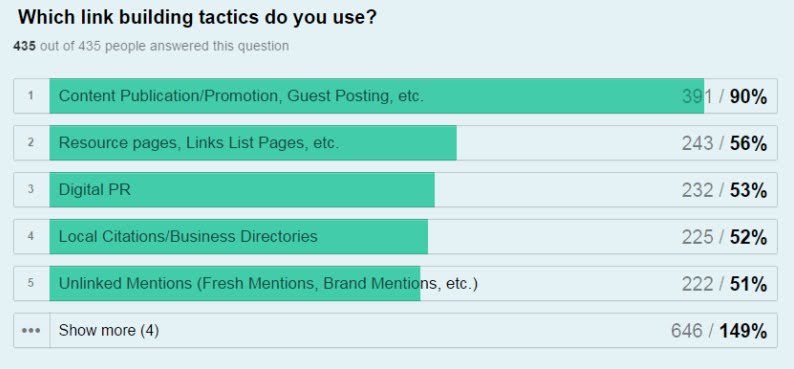
But it's still going strong; a recent Aira survey reveals that 24% of link-building teams and freelancers continue to use this strategy today.
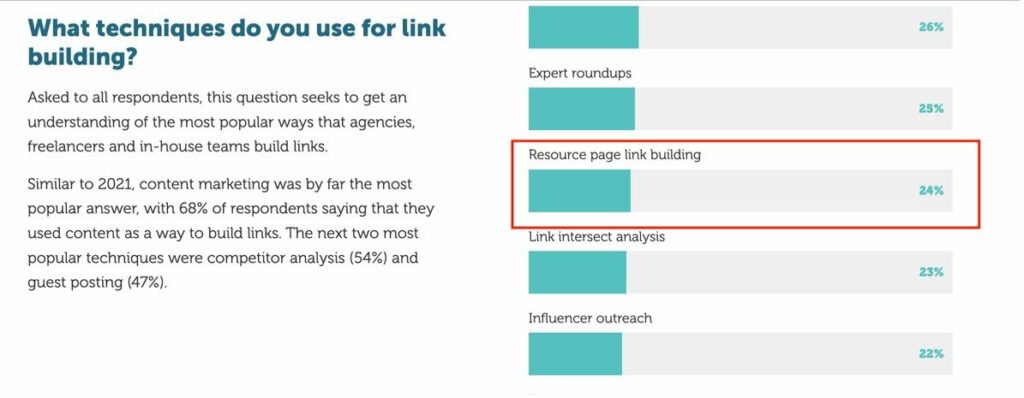
Resource: https://aira.net/state-of-link-building/link-building-techniques-and-tools/
Note: Not all RPs are just lists of links. Some may be hidden within "recommended tools" sections or even under brand "toolboxes." Keep an eye out for these opportunities—they're your tickets for relevant backlinks 😉
Why is it still so popular?
Because it works. And I’ll show you how.
Resource page link building involves crafting a page on your own website that serves as a hub of valuable resources. This could include tools, services, products, websites, or articles—all relevant to your industry.
What’s the goal?
Create a comprehensive resource that other industry websites can't help but link to because of its value.
For example, you can fill your resource page with unique statistics or valuable insights specific to your niche. This not only attracts attention but also encourages others, like journalists and niche websites, to link back to you.
Resource page link building leads to high-quality backlinks because the links are directly related to your niche.
How does it work?
First, make sure your resource page is not just filled with top resources but is also user-friendly and visually appealing.
What comes next?
Outreach.
Begin by suggesting a link swap with other websites in your industry—offer your resource page in exchange for theirs. This mutual exchange is beneficial for both sides.
However, the true value lies in regularly updating your resource page. Maintaining its relevance and appeal ensures it continues to attract more links and visitors.
Why does this strategy keep winning?
By offering fresh resources, you’re helping page owners update their sites. They often look for new content, so hard selling isn’t usually necessary.
Think about a resource page owner who's openly seeking new contributions; they might even have a call to action for submissions. This makes it easier for you to add your content and secure a link.
Here’s an example of a typical resource page on HubSpot:
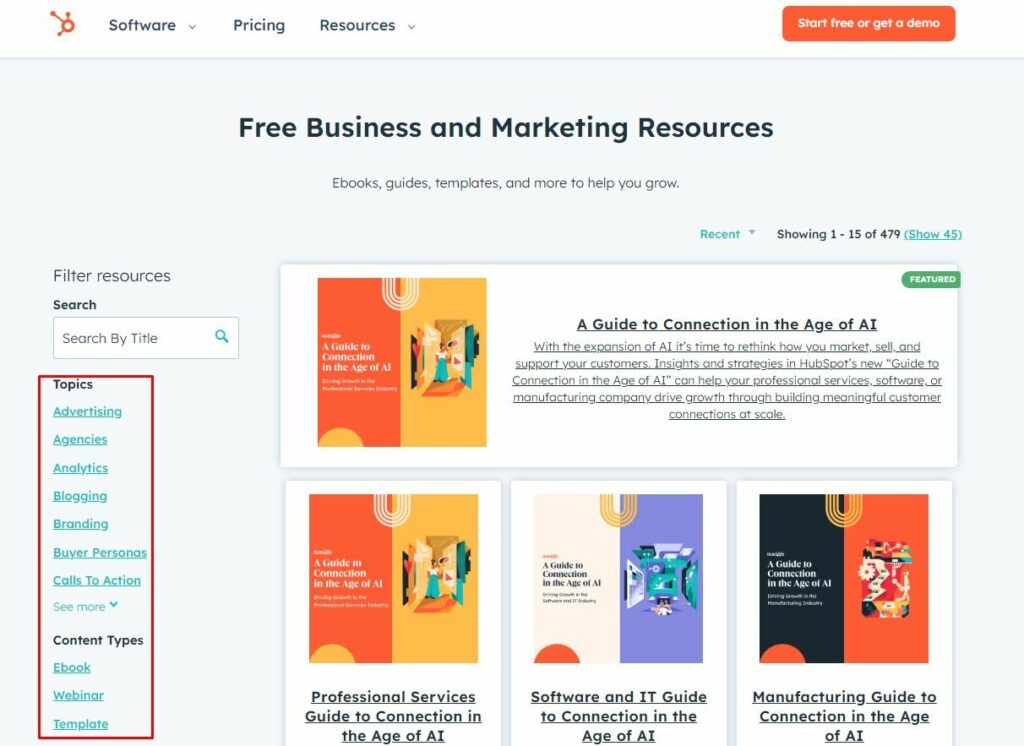
Source: https://www.hubspot.com/resources
Remember, resource page link building is about creating lasting relationships and a network of relevant content that not only drives traffic but boosts your SEO significantly.
Secure high-quality, contextually relevant backlinks from top-tier sites by contacting a professional link-building agency. Partnering with industry leaders like podium.com, monday.com, and hubspot.com, Editorial.Link ensures your links align perfectly with your brand.
Connect to the most authoritative websites and propel your digital presence forward!
How to Successfully Build Links from Resource Pages?
Building links from resource pages is all about a simple pitch: you ask a website owner to feature your site on their resource page. If they agree, you score a valuable backlink.
But how do you find these relevant pages?
Let's go through several effective methods.
Using search operators to find relevant pages
To uncover relevant resource pages, you can utilize specific search operator commands.
For instance, you might use:
[Your niche] + "resources"
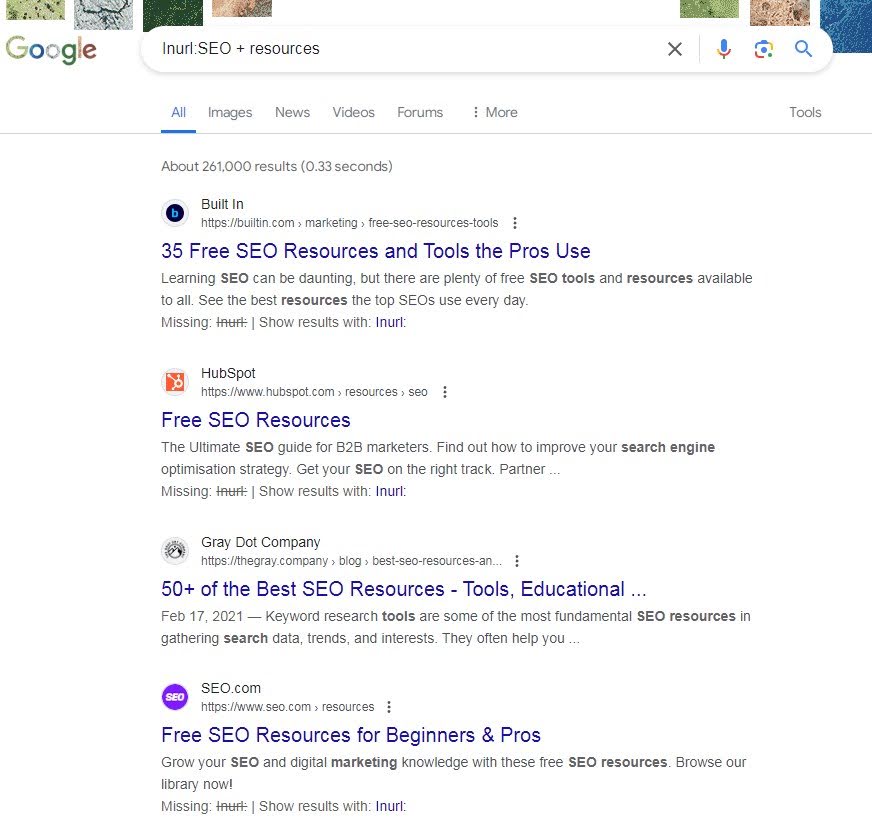
Inurl:[your niche] + resources
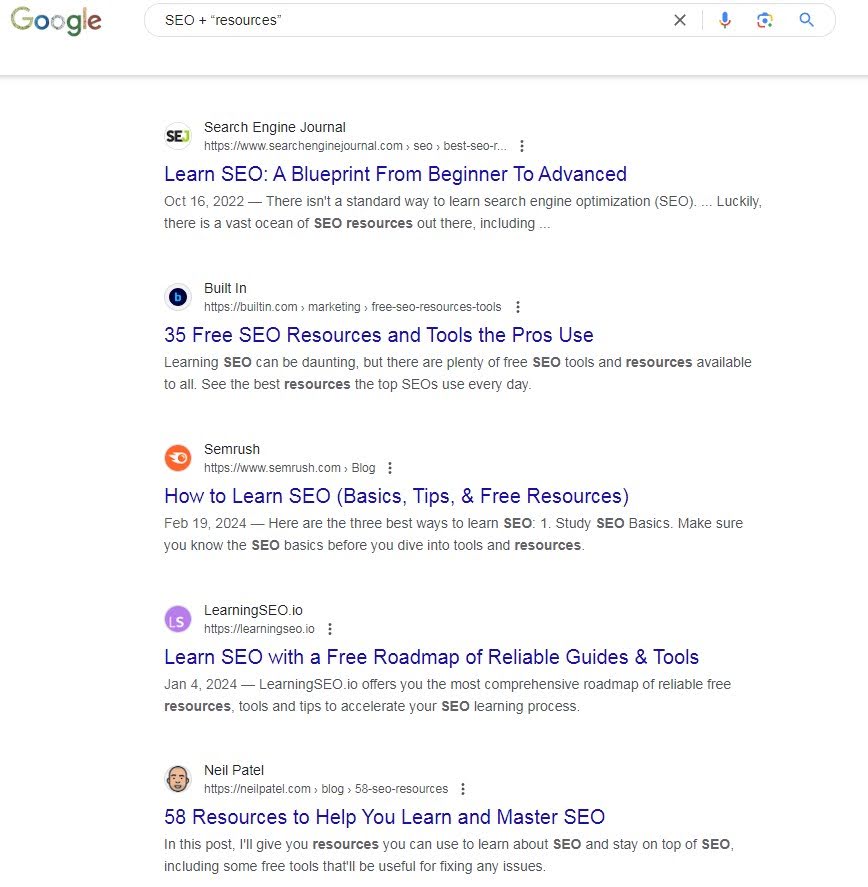
Tools like Ahrefs’ SEO Toolbar, Semrush, or Pitchbox can simplify this process significantly.
Step-by-step guide using Ahrefs' SEO toolbar:
- Install Ahrefs’ SEO Toolbar: Add this toolbar to your browser from Ahrefs' website.
- Adjust Google's Search Settings: Visit Google's preferences page and set the search results to display 100 results per page.
- Perform a Search: Go back to Google and enter a broad keyword related to your resource, followed by the search operator: intitle:resources inurl:resources.html.
For example, if your resource is an SEO ROI Calculator, your search might look like this:

- Utilize the SEO Toolbar: Click the SEO Toolbar icon in your browser, activate “SERP tools,” and enable “Results metrics” under the SERP settings.
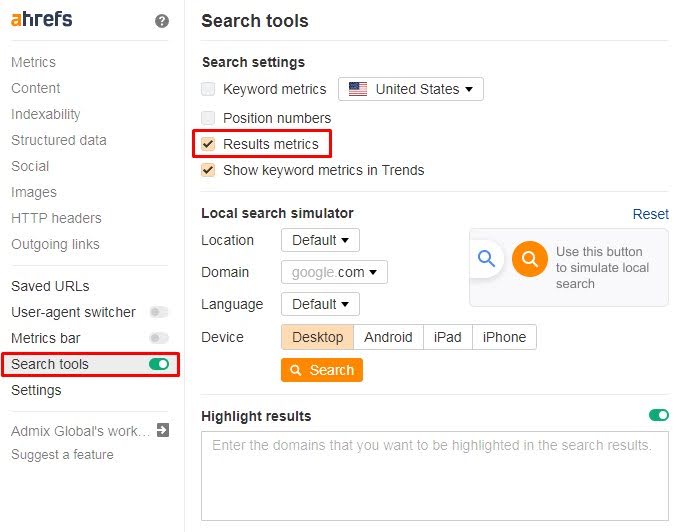
- Export the Data: An Ahrefs overlay will appear in the Google search results with an “Export CSV” button. Use this to export your findings.
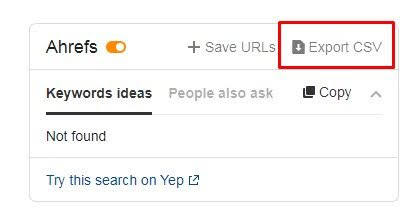
You can repeat this search with variations to broaden your search, such as:
- [your niche] intitle:resources inurl:links.html
- [your niche] intitle:links inurl:resources.html
- [your niche] inurl:.com/resources
- [your niche] inurl:resources intitle:resources
Here are more keyword examples:
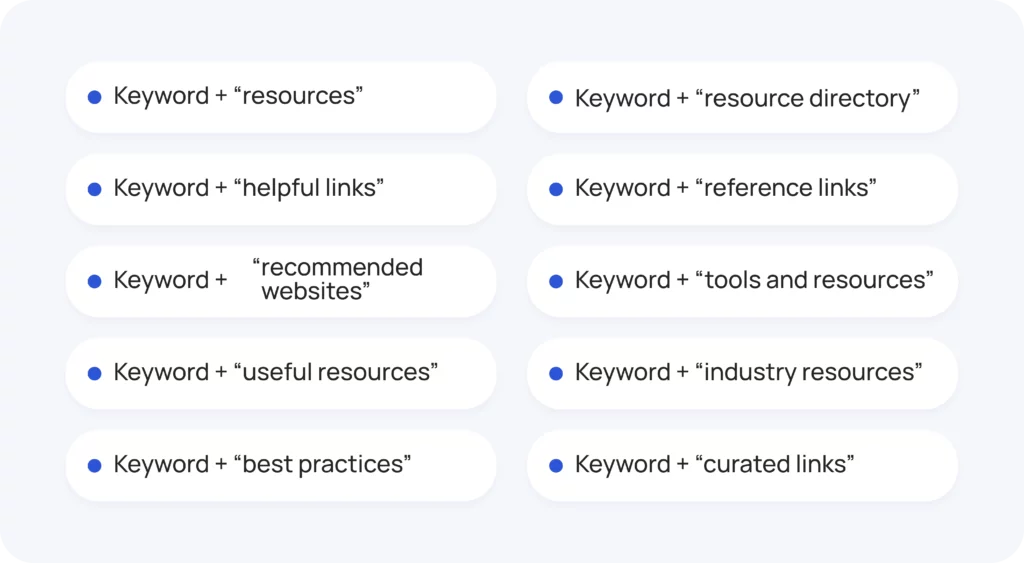
Tip: Resource opportunities aren't limited to dedicated RPs. Many blogs feature "further reading" sections with links to additional content. Use search operators like "Keyword + 'further reading'" or "Keyword + 'favorite tools'" to uncover those hidden gems.
Structuring the information
Once you've gathered data, organizing it is crucial.
Use this pre-made Google sheet (Resource Page Operators Template) designed to help you analyze and prioritize domains for link building. Here’s how:
- Input Keywords: Enter up to 10 broad keywords in the highlighted cells of the Google sheet;
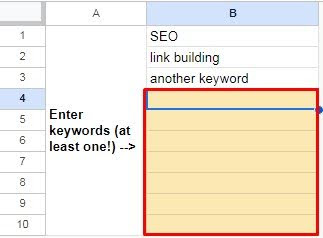
- Access Search Operators: Navigate to the “Results” tab to see a plethora of ready-to-use search operators;

- Analyze and Prioritize: Assess the domains you’re most interested in for your link-building efforts.
Choosing a broader keyword initially can yield more extensive results, making it easier to find suitable resource pages.
- Keep your search broad to avoid missing out on potential opportunities (especially if your niche is highly specific).
Tip: Don't rely solely on resource pages. Expand your strategy to include guest posting, broken link building, niche edits, linkable assets, and collaborating with influencers. Adapting to the changing SEO landscape ensures your approach remains robust and effective.
How to Analyze Resource Pages?
Once you've found potential resource pages, the next step is to vet them thoroughly before reaching out.
Why? Because you want to ensure they are worth your effort and will positively impact your SEO strategy. That’s how it works.
Vetting resource pages
First, assess the page's relevance and strength:
- Does it align with your industry and content?
- Is the quality and authority of the page high enough?
- What about metrics like Domain Rating (DR) and Domain Authority (DA)?
These indicators will tell you how valuable a backlink from the page could be.
Checking for red flags
Be cautious of link farms or pages that appear to be managed by backlink sellers. These can harm your SEO rather than help it.
How can you tell? It’s usually clear if a page has an excessive number of outbound links or if the content doesn’t quite fit the niche.
Manual review
If the technical metrics pass your initial check, it's time for a manual review.
This is where you ensure the page is actively maintained and not just a forgotten corner of the web.
Pages that link out to external, topically related resources and show signs of regular updates are what you’re looking for.
Why manual review matters
Remember, you want to add value, not just links.
Identify pages where your content naturally complements the existing resources. If you can enhance their page, your chances of a successful pitch increase dramatically.
Preparing for outreach
Once you're confident in the page's value, craft a personalized pitch. But don’t jump the gun; learn more about effective blogger outreach to refine your approach.
Also, make sure you target the right person—the one who actually updates the resource page. Your message should be concise, personal, and clearly state the mutual benefits.
For example, here's a pitch you can use:
"Hello [Name],
I came across your resource page at [link] and was really impressed by the resources you've gathered!
We've put together a [guide/tool/resource], [Your Resource], that I think would be a fantastic addition to your collection.
Would you be open to chatting about adding it to your page?
I'm excited about the possibility of contributing to your site!
Best,[Your Name]"
Don’t just introduce your content; start a conversation. After all, it's about building a strong relationship, not just getting a link 😉
Tip: Be cautious about buying backlinks since it goes against Google's guidelines and tends to backfire. If a resource page is selling links, it's probably low-quality and spammy, potentially damaging your site's credibility and SEO effectiveness.
Monitoring results
After reaching out, keep an eye on how things are going. This helps you see what's effective and tweak your strategy accordingly.
You can track the impact of your link-building efforts using tools like Google Analytics or Ahrefs/Semrush:
- Monitor changes in traffic, Domain Authority, and keyword rankings;
- Maintain a detailed record of your outreach to analyze what’s working and what’s not;
- Use this data to continuously refine your tactics and achieve your SEO goals.
Effective resource page link building is more than just scattering your links—it's about thoughtfully placing them and continuously interacting with page owners.
Final Words
Resource page link building might seem old school, but it’s still a powerhouse technique for getting quality backlinks and targeted traffic.
It's straightforward:
- Find resource pages that align with your niche;
- Get featured and watch the targeted traffic roll in.
If diving into Google searches like "inurl:[your niche] + resources" feels daunting, there's an easier way. Why not let a seasoned link-building service handle the heavy lifting?
Editorial.Link specializes in placing high-quality links on relevant, valuable resource pages, boosting your SEO with minimal effort on your part.
Reach out, and let's boost your digital presence together, making every link count toward your greater success!


